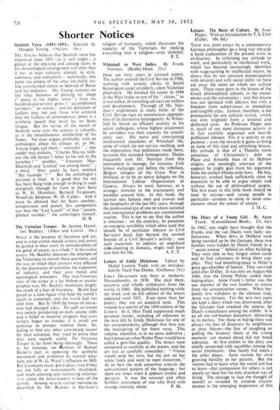Shorter Notices
Sebttish Verse (1851-1951). Selected by Douglas Young. • (Nelson. 18s.)
MR. YOUNG believes that Scottish verse has improved since 1851—as it well might ; a glance at the opening and closing items in his chronological arrangement will show that it has at least radically altered, in style, substance and aspirations ; technically, one notes tne eclipse of the once inevitable six- line two-rhymed stanza so beloved of Burns and his imitators. Mr. Young ventures on the risky business of picking six sheep (" poets in the higher sense ") from his hundred-and-seventy goats (" accomplished versifiers " or worse) ; and his definition of Lallans may not suit those who contend that the Lallans of contemporary poets is a synthetic speech that never lay on Scots tongue. But his survey of the march of Scottish verse over the century is valuable, as is the miscellaneous scholarship of his Notes. No man argues profitably with an anthologist about his choices or, as Mr. Young might call them, " outwales " ; one reader may exclaim, • Charles Murray with- out the old farmer's letter to his son in the trenches ! " another, " Fourteen Mac- Diarmids and 'Locked' not among them!" ; a third, " How could he have omitted
Shy Geordie ' ? " But the anthologist's decision is final. It is good that the net has been flung wide enough to bring in such marginals (though far from at their best) as W'. H. Hamilton, Bernard Fergusson, Winefride Simpson, W. M. Calder. And it must be allowed that for Scots acerbity, compression and punch, few competitors can beat the "Last Lauch" of that "accom- plished versifier " the anthologist himself.
H. B.










































 Previous page
Previous page